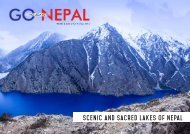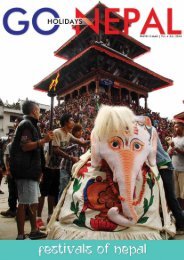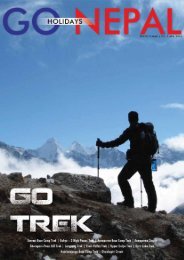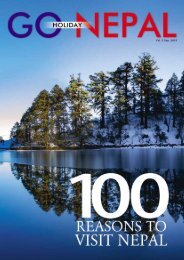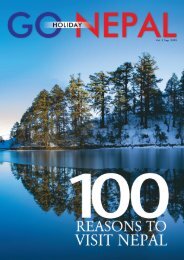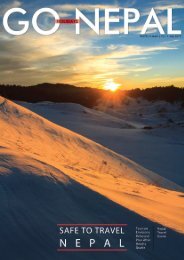Go Nepal e-Magazine
Go Nepal Holiday
Go Nepal Holiday
You also want an ePaper? Increase the reach of your titles
YUMPU automatically turns print PDFs into web optimized ePapers that Google loves.
Other things to be included are: Calamine lotion to ease<br />
irritation from bites or stings; bandages and band aids for<br />
minor injuries; scissors, tweezers, thermometer, insect<br />
repellent, sun block lotions, chopsticks, water purification<br />
tablets, throat lozenges, moleskin, Sulamyd 10 percent eye<br />
drops, paracetamol and antacid tablets.<br />
Cultural Etiquette<br />
• Some tips on the common etiquettes practiced by<br />
<strong>Nepal</strong>i people should be useful to visitors.<br />
• The form of greeting in <strong>Nepal</strong> is “Namaste” perform<br />
ing by joining both palms together. It literally means<br />
“the divine in me salutes the divine in you”.<br />
• As a mark of respect <strong>Nepal</strong>ese usually take their<br />
shoes off before entering someone’s house or place of<br />
worship.<br />
• Food or material that has been touched by another<br />
person’s mouth is considered impure or “jutho” and,<br />
therefore, is not accepted unless among close friends<br />
or family.<br />
• Touching something with feet or using the left hand<br />
to give or take may not be considered auspicious.<br />
• Women wearing skimpy outfits are frowned upon<br />
especially in the rural parts of the country.<br />
• As a part of the tradition some Hindu temples do not<br />
allow non Hindus to enter.<br />
• Leather articles are prohibited inside some temple<br />
areas.<br />
• Walking around temples or stupas is traditionally<br />
done clockwise.<br />
• To avoid conflict photography is carried out after<br />
receiving permission from the object or person.<br />
• Public displays of affection are considered scandal<br />
ous.<br />
• Nodding of head means “Yes” while shaking of head<br />
means a “No”. A slight dangling of head from left to<br />
right means “OK”.<br />
Responsible Tourism<br />
• Please be a responsible tourist. Like someone said,<br />
we request you to, “Leave only footprints, and take<br />
only photographs.”<br />
• Use designated routes, campsites and resting places<br />
to reduce trampling and other negative environmen<br />
tal impacts.<br />
• Respect local culture and traditions, use home stays,<br />
locally owned hotels/ lodges or campsites as much as<br />
possible to support the local livelihood.<br />
• Avoid/ minimize using firewood. Use common space<br />
for heating. Opt for alternatives to minimize defor<br />
estation.<br />
• Maintain cleanliness and hygiene. Use the litter box<br />
locally available. Carry back your own garbage while<br />
traveling through ecologically sensitive areas.<br />
• Encourage to place mobile toilets at a considerable<br />
distance from sources of water, river banks and<br />
springs while camping along the river sides.<br />
• Use the services of local guides and porters as much<br />
as possible to explore more about local environ<br />
ment and culture.<br />
• Money spent here will contribute directly to the local<br />
livelihood, women’s empowerment and environ<br />
mental conservation.<br />
• Before you begin your journey we request you to<br />
abide by the above guidelines in order to<br />
safeguard the nature and culture of the area and<br />
be a responsible tourist.<br />
Exchange Rates and Banking Hours<br />
The rates for purchase and sale<br />
of Euro, Pound-Sterling and US<br />
Dollar currency notes and foreign<br />
currency travellers’ cheque, where<br />
applicable, are quoted by authorized<br />
dealers/money-changers<br />
within the floor and ceiling rates<br />
worked out daily in accordance with guidelines prescribed<br />
by <strong>Nepal</strong> Rastra Bank (Formal National Bank of <strong>Nepal</strong>).<br />
For other currencies, banks quote rates based on market<br />
conditions. Currencies like Euro, Pound-Sterling, US<br />
Dollar, German Mark, Swiss Francs, French Francs and<br />
Japanese Yen are widely accepted. Large numbers of commercial<br />
banks are also available for the money exchange<br />
purpose. And if the banks are closed then you can also<br />
find local money-changer shops all over the tourist major<br />
destinations. ATM facilities can also be found in the major<br />
cities widely.<br />
Purchase of <strong>Go</strong>ods<br />
Shops/emporia selling goods or providing services to foreign<br />
tourists are permitted to accept payment in foreign<br />
exchange in the following manner:<br />
*Against internationally recognized Credit Cards.<br />
By bank drafts drawn in approved foreign currencies on<br />
banks in <strong>Nepal</strong>; By travelers cheque in foreign currency<br />
Foreign tourists are permitted by <strong>Nepal</strong>ese Customs to<br />
take with them goods purchased in <strong>Nepal</strong> (except banned<br />
items) without any value limit, provided the goods are<br />
purchased out of funds brought from abroad. Some shops<br />
and emporia also undertake to send the goods abroad as<br />
unaccompanied baggage at the request of the tourists.<br />
Restaurants and Food around <strong>Nepal</strong><br />
<strong>Nepal</strong> – and specifically Kathmandu a range of dishes can<br />
be found. A vast range of flavours can be found just in<br />
daal bhaat, the national dish of rice, lentils, lightly curried<br />
vegetables and pickles; though it can also, sometimes,<br />
be disappointingly bland. In the Kathmandu Valley, the<br />
indigenous Newars have their own unique cuisine of spicy<br />
meat and vegetable dishes, while a vast range of Indian<br />
curries, breads, snacks and sweets comes into play in the<br />
Terai; in the high mountains, the traditional diet consists




